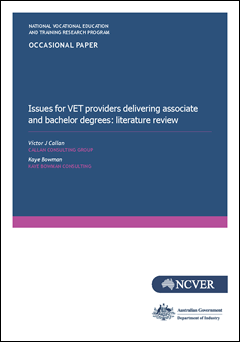Description
This literature review compares vocational education and training (VET) and higher education providers delivering diplomas, advanced diplomas, associate degrees and bachelor degrees, as well as noting the changing nature of VET and higher education. The aim is to identify the issues that VET providers face when moving into higher education provision. This paper is part of a larger project on the issues and impacts of VET providers delivering associate and bachelor degrees, including why VET providers choose to deliver these degrees, the operational issues involved and the identification of best practices.
Summary
About the research
This literature review examines the available research on vocational education and training (VET) institutions delivering associate and bachelor degrees and also sets the scene for a larger research project, VET providers delivering associate and bachelor degrees: issues and impacts, the findings of which will be released mid-2014.
This paper looks at the overlap between VET and higher education providers delivering diplomas, advanced diplomas, associate degrees and bachelor degrees (Australian Qualifications Framework levels 5 to 7), as well as briefly mentioning the changing nature of vocational education and training and higher education. The paper identifies a number of issues that VET providers face when transitioning into higher education.
Key messages
- VET organisations have been encroached from above by some universities delivering VET qualifications and from below with the expansion of VET in Schools. VET institutes are looking at other areas of delivery in order to maintain and expand their provision.
- The delivery of higher education qualifications in VET institutions supports efforts to improve access to higher education for disadvantaged groups.
- There is some argument that VET organisations choose to deliver higher education qualifications in order to confer more status on and recognition to the organisation.
- The use of non-graded assessment in VET raises questions over the capability of VET providers to deliver higher education qualifications, which are based on graded assessment.
- VET providers who choose to deliver higher education qualifications face significant operational, financial, human resource and administrative costs.
- VET institutions with more effective credit transfer arrangements have specific support strategies in place to help students to transition to higher education qualifications.
The larger project will draw on case studies with both public and private VET providers who are delivering associate and bachelor degrees in order to understand why they chose to deliver these predominantly higher education degrees and the issues that they face in their delivery. This will help to inform models of best practice.
Rod Camm
Managing Director, NCVER
